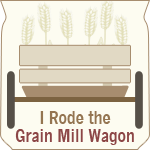…is still thorny.
The Corn Refiners Association is on a mission to change the negative image of high fructose corn syrup (HFCS) in the public eye by giving it a new name… corn sugar. They’ve applied to the federal government to make the name change official, but in the meantime, they’ve already launched an advertising campaign with Facebook, twitter, a website , and TV commercials. Their main point of attack is that HFCS is metabolized in your body just like real sugar, so it’s no more or less dangerous to consume than your average granulated sugar. Their favorite argument, which I have read in multiple articles and sources, is, “The bottom line is people should consume less of all sugars.”
Now that much is definitely true, and I can whole-heartedly stand behind such a statement. It’s the question of whether or not HFCS is worse than regular sugar that leaves me scratching my head when I try to delve into the topic. I am no scientist, and I don’t claim to be able to understand or rationally sift through all the opposing information that is available on the subject. It’s hard to know who is speaking independently, without a political or financial investment in their point of view. If you’re interested, this article explains some of the history of HFCS and the issues behind it and discusses the topic with people on all sides of the conflict. It’s difficult to wade through all the evidence and the assertions to arrive at a confident conclusion.
There are, however, a few things I know to be true.
1. HFCS is experiencing a 20-year low in public consumption. This is a widely published, accepted fact.
2. The Corn Refiners Association is made up of corn refiners who are losing a lot of money because their product has earned a lot of negative press and is regarded warily by many consumers.
3. HFCS is highly refined, and far removed from its natural state.
4. HFCS has no health benefits whatsoever.
5. All the nutritional experts agree that, whether or not it is actually harmful, it should be consumed in small quantities. This is difficult to do when it is hidden in so many processed foods.
My personal opinion, for what it’s worth, is that whether or not HFCS - or corn sugar, whatever you want to call it - may not necessarily be detrimental to your health (although that’s hard for me to swallow), it’s certainly not good for you! If the best argument in its favor, and the crux of its makers’ campaign, is that it’s “just as bad as every other sugar”, well then. That indicates to me that it’s not something I want to be a regular part of my diet, as no one is even attempting to argue that it has actual health and nutritional benefits.
So no matter what it’s called, I will continue to avoid buying foods containing this ingredient, and will continue to focus on limiting my overall consumption of sweeteners. Yes, I know, it’s practically impossible to eliminate HFCS altogether, but it helps when you make most of your food from scratch and avoid obvious sources like soda and sweets.
What about you? Do you avoid HFCS/corn sugar?



RELEVANT Meet & Greet: http://ordinaryinspirations.blogspot.com/2010/10/20-days-till-relevant-meet-some-of.html
Can't wait to see you there!
Traci
Hi,
I have been doing research on HFCS for the past three years.
First the big problem with comparing sugar (sucrose) with HFCS is that it is really HFCSs.
Archer-Daniels-Midland, a major
corn refiner, makes three grades:
Cornsweet 42,
Cornsweet 55, used for soda
Cornsweet 90, intensely sweet used
for low-cal foods and beverages.
The #'s reflect the % of fructose.
42%-> 90%. That's quite a range.
As you know, it's the excess fructose that has contributed to our health woes.
The ingredient "HFCS" is a black box. Is it HFCS=42, 55, 90, or
something inbetween? Only your liver knows for sure.
Trying to get the HFCS-out,
Cynthia Papierniak, M.S.
btw: I am working on a paper about HFCS. Email me and I can send it
as an attachment. There are graphs
which won't transmit in a comment
box.
Cynthia, thanks for stopping by and for the information! I am glad there are people smarter than me researching this topic and getting the word out. Concerning fructose… even that topic has people on all sides of the debate, some going so far as to say that even naturally occurring fructose in fruit should be eaten in small quantities. I am not willing to go that far, but I do limit juice in part for that reason, and that's why I dont' use agave syrup anymore either. You can send your information to quickeasycheaphealthy at gmail dot com.